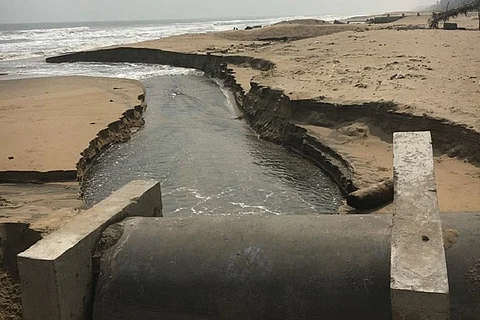

The 100 MLD Nemmeli desalination plant not only turns salt water into drinking water, but also converts good, clean potable drinking water into polluted, unpotable salt water. The video below, shot on December 9, 2016 by Pooja Kumar of the Coastal Resource Centre, shows the continuing discharge of toxic hypersaline rejects (effluents) from the desalination plant directly onto the beach.
The environmental clearance for the plant, issued by the Ministry of Environment and Forests, states that brine rejects (effluent) should be discharged via a submarine pipeline at a distance of 600 metres, and a depth of eight metres. The CRZ Notification prohibits the discharge of effluents on the beach.
The ill-designed plant run by the Chennai Metro Water Supply and Sewerage Board has been causing environmental damage from the time it was constructed. In May 2013, fisherfolk of the nearby Sulerikattukuppam village complained when structures built into the sea for plant construction triggered rapid sea erosion resulting in the loss of an entire line of community buildings built by the Rotary Club after the 2004 tsunami. The landward advance of the sea also turned water in handpumps in the area saline, forcing the neighbours of this drinking water factory to rely on expensive bottled water.
The state government responded promptly to the complaints by jailing tens of fishermen. The fishermen were released after spending a month in Puzhal jail. Problems continued for the fishermen as they were barred access to fishing grounds in the vicinity of the plant's intake pipeline.
Rather than act on fisherpeople’s complaints against Metrowater for violating the law and endangering fisher livelihoods and safety, the Mamallapuram police acted on Metrowater's complaint against the Sulerikattukuppam fisherfolk and carried out a midnight raid in August 2013. Six people, including two school students, were picked up from their homes in the village. The village was terrorised, and has not complained even once since.
Details of environmental and human rights violations arising from the construction and operation of the Nemmeli desalination plant can be obtained from a fact-finding report that was released in September 2013.
Sulerikattukuppam in 2011 (above) and in 2013 (below).
Not content with the damaged being caused by the 100 MLD plant, Metrowater now proposes to construct another 150 MLD plant at the same location. This plant will be financed by Germany's KfW. Another 400 MLD plant is proposed at Nemmelikuppam village 3km north of the existing plant. Japan's JICA has been approached for this plant.
The two proposals are currently awaiting clearance from the Ministry of Environment, Forest and Climate Change. The project documents falsely describe the beach space as barren land masking the multiple uses that fisherfolk put these livelihood commons to. They also hide the presence of sand dunes at the Nemmeli project site.
Both projects fail to adequately and accurately assess the impact on local environment and fisher livelihoods. Construction on the coast comes with the risk of erosion and increased vulnerability to storms and cyclones. Such construction also requires flattening of dunes, and pumping out of groundwater during the foundation-laying phase. Both acts will result in salinisation of groundwater and salinity ingress into inland aquifers.
Although the CRZ Notification, 2011, requires the preparation of a Coastal Zone Management Plan that identifies and recognises the rights of fisherfolk to coastal and ocean livelihood commons, the current projects are being considered without any such plan. The Notification also requires the preparation of a long-term housing plan for fisherfolk. The spirit of the law is to prevent diversion of vacant spaces in coastal areas until fisher livelihoods and living spaces are guaranteed, and ecological considerations are met.
Villagers are concerned about pollution, loss of livelihood spaces and erosion. They are worried that erosion will bring the sea closer and expose them to danger. They know from past experience that MetroWater's assurances of "negligible" impact are baseless, and that the statutory conditions imposed as part of the environmental clearance by the Ministry of Environment will not be followed. They know that the Tamil Nadu Pollution Control Board and the State Coastal Zone Management Authority will take no action in the event of violation. They know that they will be terrorised by the police if they voice their fears.
Their past experience has left them confused about which is more fearful – the Government of Tamil Nadu or an angry sea.
Nityanand is a Chennai-based writer and social activist.